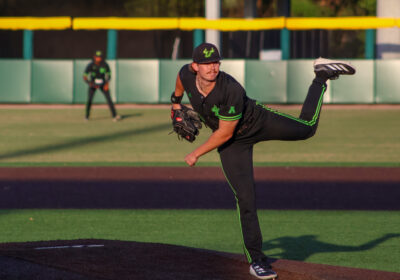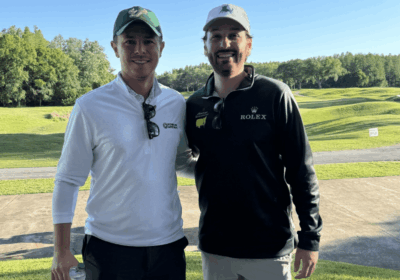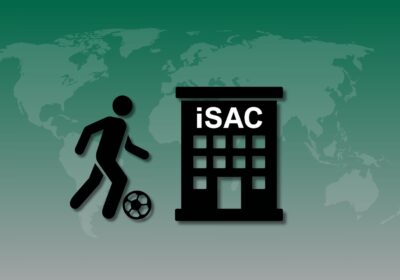Family, Faith and Football

D'Ernest Johnson scampers into the end zone to score against Illinois. SPECIAL TO THE ORACLE/GOUSFBULLS
On average, there are 1,086,627 high school football players. That number gets shaved down to 70,147 college football players. Of football players in the NCAA, only 1.6 percent make the transition to the NFL.
But what happens if you don’t make it to the NFL? In the past, players would turn to the Canadian Football League, arena football or some other league secondary to the NFL.
As one former-USF running back found out, there is a new option — in the American Alliance of Football (AAF) with the Orlando Apollos.
D’Ernest Johnson was part of a two-headed running back scheme alongside Darius Tice for USF in 2017. At the end of the season, Johnson was invited to play in the East-West Shrine game, which is an all-star game for college football players. He participated in USF’s pro day in front of scouts from professional organizations. Johnson is USF’s career all-purpose yards leader (4,186) and leads all USF running backs with receiving yards (909) and receptions (73).
He received a call to attend the New Orleans Saints’ mini-camp but didn’t secure a roster spot. No other teams expressed interest in the running back out of Immokalee High School.
“I went out there for three days and gave it my all, but they ended up not signing me,” Johnson said. “After that it was tough.”
Johnson found a job as a personal trainer at a YouFit gym in Gainesville. While he was working, he was also training for tryouts in these various football leagues. He tried out with the American Patriot League (APL), which starts its inaugural season April 6.
But Johnson didn’t end up playing for a team in the APL.
“A couple of weeks after that, I get a call from the Orlando Apollos,” Johnson said. “They called me and told me they wanted to bring me into camps and stuff. I ended up signing a contract with them.”
The Orlando Apollos is a team in the AAF that is coached by Steve Spurrier, who led the Florida Gators to a national championship in 1996.
“Coach Spurrier takes control of the whole offense,” Johnson said. “He’s an offensive guy. He wants us all to make plays.”
Johnson declined to give his personal contract information, but a typical contract in the AAF is a three-year, $250,000 deal signed with the league itself. Players make $70,000 their first season, $80,000 their second and $100,000 in the final year of their contract. The average NFL practice squad member in 2018 made no less than $7,600 every week, which equates to $129,200 for a season.

Johnson tries to find a hole in the line of scrimmage in the East-West Shrine Game in 2017. SPECIAL TO THE ORACLE/GOUSFBULLS
Johnson went to San Antonio to train with the team and was named to the Apollos’ 52-man roster. Now that he’s made the team, Johnson is able to look back at how he got there.
“I needed to have faith in The Man above, trusting that he’s going to make everything work out and make something happen for me,” Johnson said. “Even those days I didn’t want to go work out, I knew I had to because one day it’s going to pay off.”
There were some nights where Johnson would flip on the TV after his workouts and his former teammates were in the national spotlight playing in front of a massive audience. Johnson left USF the same time as Deadrin Senat, Bruce Hector, Marques Valdez-Scantling, Mike Love, Deatrick Nichols and Quinton Flowers — all of whom had a spot on their team’s active or practice team rosters.
“It was definitely a low point,” he said. “Watching these NFL games knowing that I should be there right now. It changed me to let me know that you can’t take this game for granted because it can be taken away from you at any second.”
But with the low points, Johnson found some silver linings while he was working to become a professional football player.
“There have been high points, just being able to spend time with my family,” he said. “In college, I didn’t get that much time to spend with my people, especially my son because I was away in college.”
Johnson’s son, who turns 4 in February, plays a big role in the running back’s motivation. Johnson was raised by his grandmother and his aunt, so he said he wants to be the best father figure he can.
“My family has been a big part of what’s happened,” Johnson said. “Having them there to believe in me when sometimes I didn’t even believe in myself.”
The main difference between the AAF and the NFL is that there will be no kickoff plays. Teams will start the ball on their own 25-yard lines as if they just called a touchback in the NFL. Although it is not exactly the same as the NFL, Johnson knows this season is just one part in his professional career.
“Getting paid to play football, it’s always been my dream to play in the NFL, but this is one step closer to get to the NFL, I’m just taking a different route,” he said.
Johnson’s hard work and determination will come to fruition when the Apollos take on the Atlanta Legends at Spectrum Stadium on Saturday, Feb 9 at 8 p.m. The game will be aired on CBS for the kickoff weekend.







